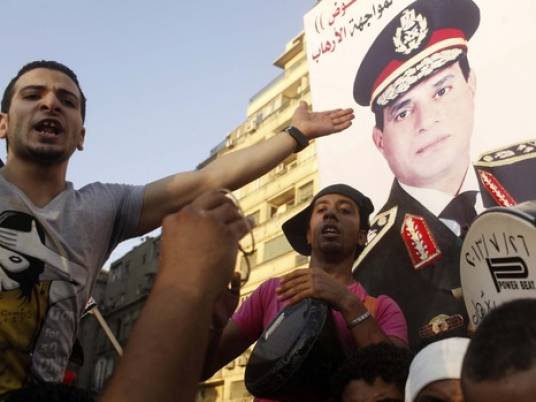
“Sisi and the Candidacy Risk” was the title chosen by Saudi columnist Abdul Rahman Al-Rashed for his article on the possibility of Defense Minister Abdel Fattah al-Sisi running in the coming presidential elections and the repercussions of it on the man that he considered the kingpin of Egyptian politics.
He called it a “dangerous adventure” in his article posted on the website of Asharq Al-Awsat, although the man enjoys “sweeping popularity” that can guarantee him a “real victory” or a victory that is not “incomplete” as in the case of Mohamed Morsy, or that is “rigged” as in the case of Hosni Mubarak.
Then he calls it a “mistake” because ruling Egypt is not a “guaranteed” mission as it had been since 1952, for the political system has not yet stabilized since the outbreak of the 25 January revolution.
The popular mood quickly swings between loving and hating the army or the Muslim Brotherhood, Rashed says.
Sisi is too important to be president, he says, adding that he should remain the controller of politics, the guardian of the new constitution and the protector of the regime.
Rashed goes on to say that if Sisi assumes an executive office he will become part of the problem and there would be no one to defend the historic transition as he did in July after the popular demonstrations that led to the removal of President Morsy and the fascist rule of the Muslim Brotherhood.
He says that coming down from taking care of the presidency to the presidency itself would bring Sisi many problems in the coming four years, as his opponents would not be limited to the Brotherhood but would also extend to certain groups that would have economic and social demands that the difficult conditions during that period would produce.
He also warns that Sisi might be forced to resign before the end of his term if objections reach a boiling point, for the people who succeeded in toppling Mubarak would not wait four years if economic or political conditions deteriorate.
Though Rashed admits that there is no one else with similar leadership advantages, he still mentions four other possible candidates, namely Abdel Moneim Abul Fotouh, Hamdeen Sabahi, Amr Moussa and Ahmed Shafiq.
But he also says that a large segment of the Egyptian society is accustomed to a president with a military background, although the army had moved away from the political scene in past times of turmoil.
And although Rashed admits that the army was the bulwark against the Brotherhood and responded to the demands of millions to dismiss Morsy and his group, he still asks at the end of the article:
Who would the Egyptians resort to if they march to the squares of Cairo and how would they be dealt with?
Edited translation from Al-Masry Al-Youm
